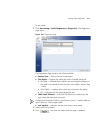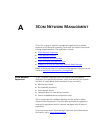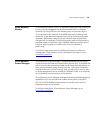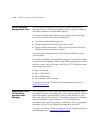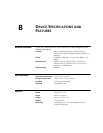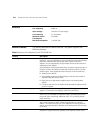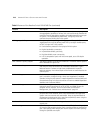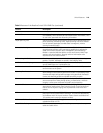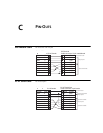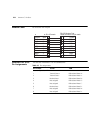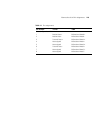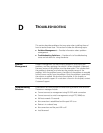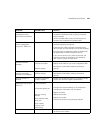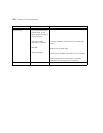
Switch Features 219
Power over Ethernet Provides power to devices over LAN connection.
RADIUS Clients RADIUS is a client/server-based protocol. A RADIUS server maintains a
user database, which contains per-user authentication information, such
as user name, password and accounting information.
Rapid Spanning Tree Spanning Tree can take 30-60 seconds for each host to decide whether its
ports are actively forwarding traffic. Rapid Spanning Tree (RSTP) detects
uses of network topologies to enable faster convergence, without
creating forwarding loops.
Remote Monitoring Remote Monitoring (RMON) is an extension to SNMP, which provides
comprehensive network traffic monitoring capabilities (as opposed to
SNMP which allows network device management and monitoring).
RMON is a standard MIB that defines current and historical MAC-layer
statistics and control objects, allowing real-time information to be
captured across the entire network.
Self-Learning MAC Addresses The device enables automatic MAC address learning from incoming
packets. The MAC addresses are stored in the Bridging Table
SNMP Alarms and Trap Logs The system logs events with severity codes and timestamps. Events are
sent as SNMP traps to a Trap Recipient List.
SNMP Versions 1 and 2 Simple Network Management Protocol (SNMP) over the UDP/IP protocol
controls access to the system.
Spanning Tree Protocol 802.1d Spanning tree is a standard Layer 2 switch requirement that
allows bridges to automatically prevent and resolve L2 forwarding loops.
Switches exchange configuration messages using specifically formatted
frames and selectively enable and disable forwarding on ports.
SSL Secure Socket Layer (SSL) is an application-level protocol that enables
secure transactions of data through privacy, authentication, and data
integrity. It relies upon certificates and public and private keys.
Static MAC Entries MAC entries can be manually entered in the Bridging Table, as an
alternative to learning them from incoming frames. These user-defined
entries are not subject to aging, and are preserved across resets and
reboots.
TCP Transport Control Protocol (TCP). TCP connections are defined between 2
ports by an initial synchronization exchange. TCP ports are identified by
an IP address and a 16-bit port number. Octets streams are divided into
TCP packets, each carrying a sequence number.
TFTP Trivial File Transfer Protocol The device supports boot image, software and configuration
upload/download via TFTP.
Virtual Cable Testing VCT detects and reports copper link cabling occurrences, such as open
cables and cable shorts.
Table 9 Features of the Baseline Switch 2924-PWR Plus (continued)
Feature Description



